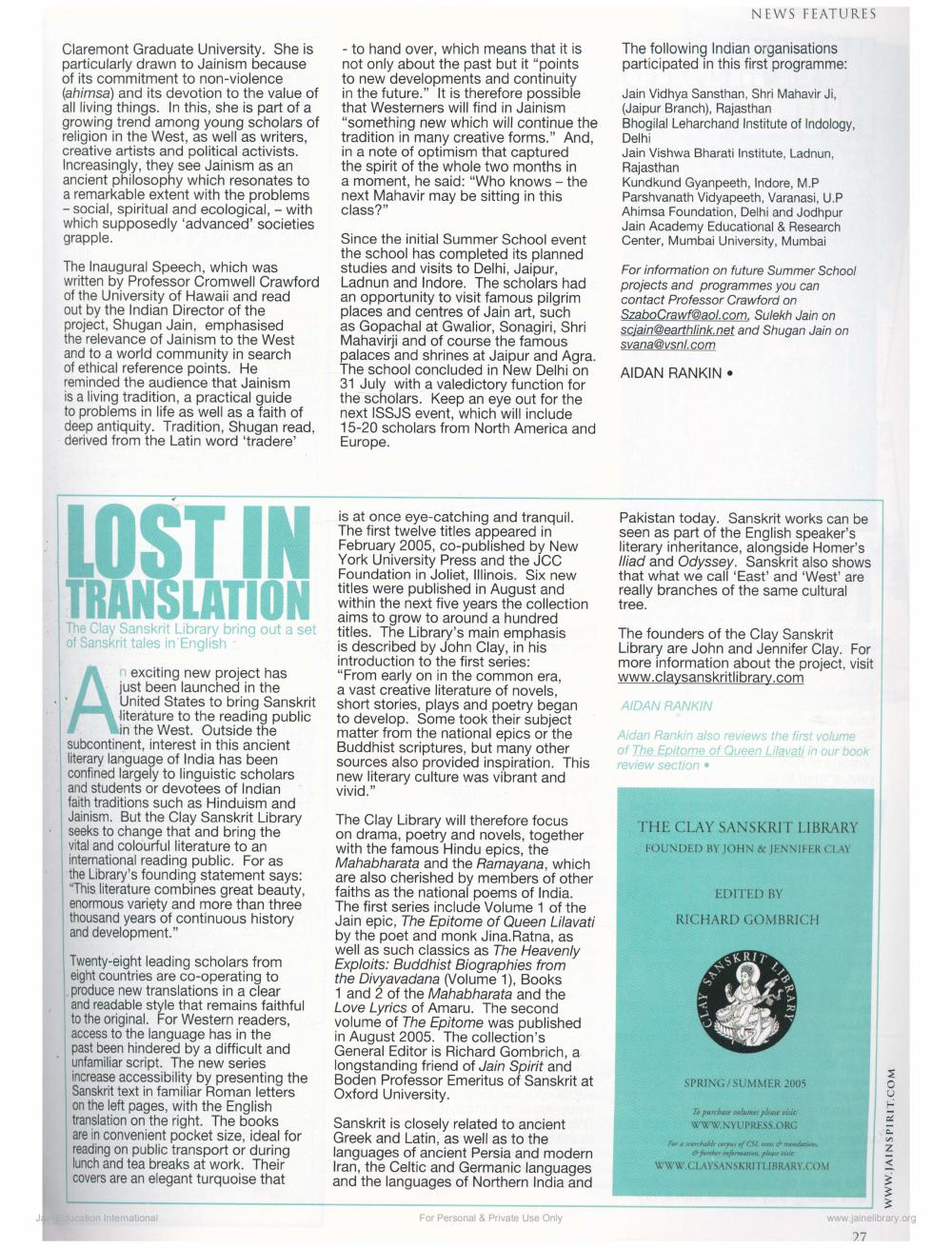________________
NEWS FEATURES
The following Indian organisations participated in this first programme:
Claremont Graduate University. She is particularly drawn to Jainism because of its commitment to non-violence (ahimsa) and its devotion to the value of all living things. In this, she is part of a growing trend among young scholars of religion in the West, as well as writers, creative artists and political activists. Increasingly, they see Jainism as an ancient philosophy which resonates to a remarkable extent with the problems - social, spiritual and ecological, - with which supposedly 'advanced societies grapple.
to hand over, which means that it is not only about the past but it "points to new developments and continuity in the future." It is therefore possible that Westerners will find in Jainism "something new which will continue the tradition in many creative forms." And, in a note of optimism that captured the spirit of the whole two months in a moment, he said: "Who knows-the next Mahavir may be sitting in this class?"
Jain Vidhya Sansthan, Shri Mahavir Ji, (Jaipur Branch), Rajasthan Bhogilal Leharchand Institute of Indology, Delhi Jain Vishwa Bharati Institute, Ladnun, Rajasthan Kundkund Gyanpeeth, Indore, M.P Parshvanath Vidyapeeth, Varanasi, U.P Ahimsa Foundation, Delhi and Jodhpur Jain Academy Educational & Research Center, Mumbai University, Mumbai
Since the initial Summer School event the school has completed its planned studies and visits to Delhi, Jaipur, Ladnun and Indore. The scholars had an opportunity to visit famous pilgrim places and centres of Jain art, such as Gopachal at Gwalior, Sonagiri, Shri Mahavirji and of course the famous palaces and shrines at Jaipur and Agra. The school concluded in New Delhi on 31 July with a valedictory function for the scholars. Keep an eye out for the next ISSJS event, which will include 15-20 scholars from North America and Europe.
The Inaugural Speech, which was written by Professor Cromwell Crawford of the University of Hawaii and read out by the Indian Director of the project, Shugan Jain, emphasised the relevance of Jainism to the West and to a world community in search of ethical reference points. He reminded the audience that Jainism is a living tradition, a practical guide to problems in life as well as a faith of deep antiquity. Tradition, Shugan read, derived from the Latin word 'tradere
For information on future Summer School projects and programmes you can contact Professor Crawford on
[email protected], Sulekh Jain on
[email protected] and Shugan Jain on
[email protected]
AIDAN RANKIN
Pakistan today. Sanskrit works can be seen as part of the English speaker's literary inheritance, alongside Homer's Iliad and Odyssey. Sanskrit also shows that what we call 'East' and 'West' are really branches of the same cultural tree.
TRANSLATION
The Clay Sanskrit Library bring out a set of Sanskrit tales in English
is at once eye-catching and tranquil. The first twelve titles appeared in February 2005, co-published by New York University Press and the JCC Foundation in Joliet, Illinois. Six new titles were published in August and within the next five years the collection aims to grow to around a hundred titles. The Library's main emphasis is described by John Clay, in his introduction to the first series: "From early on in the common era, a vast creative literature of novels, short stories, plays and poetry began to develop. Some took their subject matter from the national epics or the Buddhist scriptures, but many other sources also provided inspiration. This new literary culture was vibrant and
The founders of the Clay Sanskrit Library are John and Jennifer Clay. For more information about the project, visit www.claysanskritlibrary.com
AIDAN RANKIN
Aldan Rankin also reviews the first volume of The Epitome of Queen Lilavati in our book
vivid."
n exciting new project has just been launched in the United States to bring Sanskrit literature to the reading public
in the West. Outside the subcontinent, interest in this ancient literary language of India has been confined largely to linguistic scholars and students or devotees of Indian faith traditions such as Hinduism and Jainism. But the Clay Sanskrit Library seeks to change that and bring the vital and colourful literature to an international reading public. For as the Library's founding statement says: "This literature combines great beauty, enormous variety and more than three thousand years of continuous history and development."
THE CLAY SANSKRIT LIBRARY FOUNDED BY JOHN & JENNIFER CLAY
EDITED BY RICHARD GOMBRICH
Twenty-eight leading scholars from eight countries are co-operating to produce new translations in a clear and readable style that remains faithful to the original. For Western readers, access to the language has in the past been hindered by a difficult and unfamiliar script. The new series increase accessibility by presenting the Sanskrit text in familiar Roman letters on the left pages, with the English translation on the right. The books are in convenient pocket size, ideal for reading on public transport or during lunch and tea breaks at work. Their covers are an elegant turquoise that
The Clay Library will therefore focus on drama, poetry and novels, together with the famous Hindu epics, the Mahabharata and the Ramayana, which are also cherished by members of other faiths as the national poems of India. The first series include Volume 1 of the Jain epic, The Epitome of Queen Lilavati by the poet and monk Jina.Ratna, as well as such classics as The Heavenly Exploits: Buddhist Biographies from the Divyavadana (Volume 1), Books 1 and 2 of the Mahabharata and the Love Lyrics of Amaru. The second volume of The Epitome was published in August 2005. The collection's General Editor is Richard Gombrich, a longstanding friend of Jain Spirit and Boden Professor Emeritus of Sanskrit at Oxford University.
SPRING/SUMMER 2005
To prawie WWW.NYUPRESS.ORG
Sanskrit is closely related to ancient Greek and Latin, as well as to the languages of ancient Persia and modern Iran, the Celtic and Germanic languages and the languages of Northern India and
WWW.JAINSPIRIT.COM
WWW.CLAYSANSKRITLIBRARY.COM
J
c ation International
For Personal & Private Use Only
www.jainelibrary.org
27
